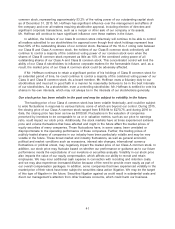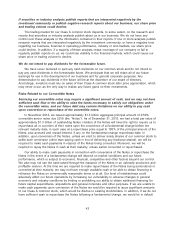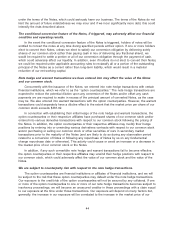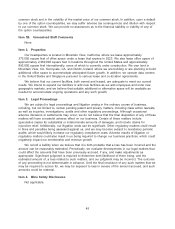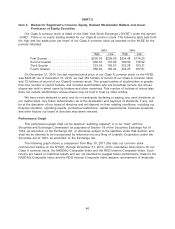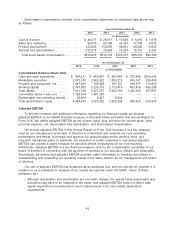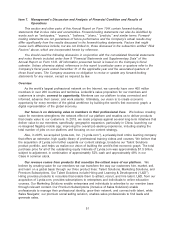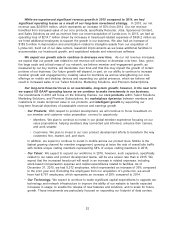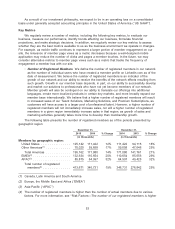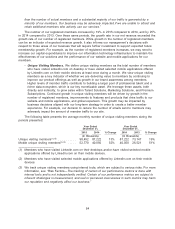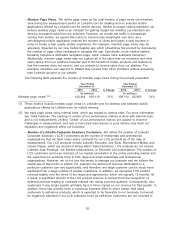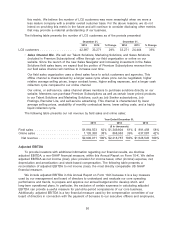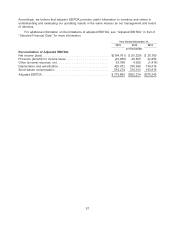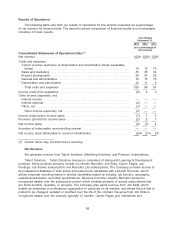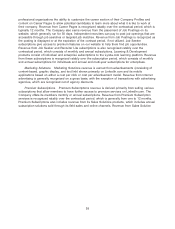LinkedIn 2015 Annual Report Download - page 51
Download and view the complete annual report
Please find page 51 of the 2015 LinkedIn annual report below. You can navigate through the pages in the report by either clicking on the pages listed below, or by using the keyword search tool below to find specific information within the annual report.
Stock-based compensation included in the consolidated statements of operations data above was
as follows:
Year Ended December 31,
2015 2014 2013 2012 2011
(in thousands)
Cost of revenue ...................... $ 48,577 $ 28,617 $ 15,600 $ 6,416 $ 1,678
Sales and marketing ................... 96,076 60,166 36,187 17,726 8,074
Product development .................. 233,006 154,856 98,861 46,026 13,625
General and administrative .............. 132,615 75,494 43,267 16,151 6,391
Total stock-based compensation ......... $510,274 $319,133 $193,915 $86,319 $29,768
As of December 31,
2015 2014 2013 2012 2011
(in thousands)
Consolidated Balance Sheet Data:
Cash and cash equivalents ....... $ 546,237 $ 460,887 $ 803,089 $ 270,408 $339,048
Marketable securities ........... 2,573,145 2,982,422 1,526,212 479,141 238,456
Property and equipment, net ...... 1,047,005 740,909 361,741 186,677 114,850
Working capital ............... 2,747,005 3,239,315 2,113,479 603,418 499,268
Total assets .................. 7,011,199 5,427,257 3,352,793 1,382,330 873,697
Convertible senior notes, net ...... 1,126,534 1,081,553 — — —
Redeemable noncontrolling interest . 26,810 5,427 5,000 — —
Total stockholders’ equity ........ 4,468,643 3,325,392 2,629,394 908,424 624,979
Adjusted EBITDA
To provide investors with additional information regarding our financial results, we disclose
adjusted EBITDA, a non-GAAP financial measure, in the table below and within this Annual Report on
Form 10-K. We define adjusted EBITDA as net income (loss), plus: provision for income taxes; other
(income) expense, net; depreciation and amortization; and stock-based compensation.
We include adjusted EBITDA in this Annual Report on Form 10-K because it is a key measure
used by our management and board of directors to understand and evaluate our core operating
performance and trends, to prepare and approve our annual budget and to develop short- and
long-term operational plans. In particular, the exclusion of certain expenses in calculating adjusted
EBITDA can provide a useful measure for period-to-period comparisons of our core business.
Additionally, adjusted EBITDA is a key financial measure used by the compensation committee of our
board of directors in connection with the payment of bonuses to our executive officers and employees.
Accordingly, we believe that adjusted EBITDA provides useful information to investors and others in
understanding and evaluating our operating results in the same manner as our management and board
of directors.
Our use of adjusted EBITDA has limitations as an analytical tool, and you should not consider it in
isolation or as a substitute for analysis of our results as reported under US GAAP. Some of these
limitations are:
• although depreciation and amortization are non-cash charges, the assets being depreciated and
amortized may have to be replaced in the future, and adjusted EBITDA does not reflect cash
capital expenditure requirements for such replacements or for new capital expenditure
requirements;
49




